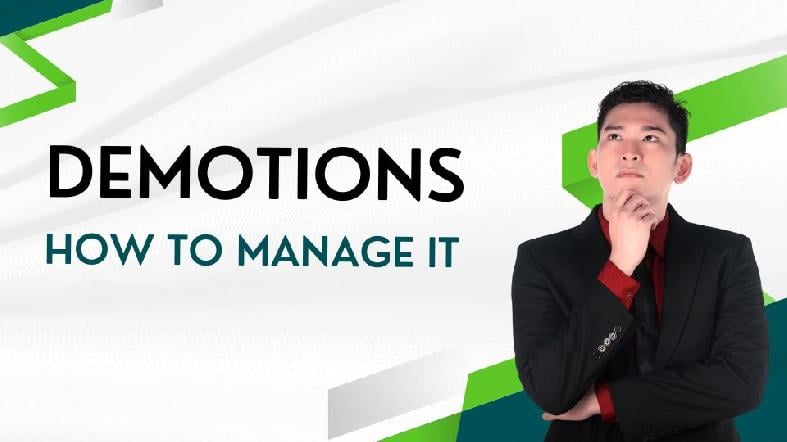
How to Manage Employee Demotions Properly
Are You Hiring?
Find candidates in 72 Hours with 5+ million talents in Maukerja Malaysia & Ricebowl using Job Ads.
Hire NowThe first thing that comes to mind when you hear of an internal job change in a company is promotions. Employees occasionally face the other end of the stick, such as demotions or pay cuts.
This can be a challenging position for employers, managers, and HR experts to address. Here's how pay cuts and demotions affect employees and what managers and employers can do to soften the blow.
Understanding employee demotions
When an employee is demoted, it signifies that the organisation has lowered their particular position or rank within the company.
A pay cut is a reduction in an employee's pay. It can happen to a demoted employee or a worker who is keeping their current position or rank within the organisation.
An employee may be demoted for a variety of reasons, including:
-
Poor work ethic
-
Company restructuration
-
Unsatisfactory performance
-
Breaking workplace policy
-
Disciplinary issues
Do employers have the power to demote an employee?
Short answer: Yes.
Long answer: Also, yes. Section 14 of the Employment Act states if an employee has committed misconduct and it was proven to be true via an inquiry, the employer has three choices:
-
Dismiss the employee without notice,
-
Downgrade or demote the employee, or
-
Impose lesser punishment as they deem fit. If they want to suspend the employee without wages, the suspension cannot exceed two weeks.
However, do note that this only applies to employees in West Malaysia who make RM2,000 and under and those who are engaged in physical labour.
For those who are not covered under the Employment Act, the employment contract should include clauses for poor performance and misconduct.
How to manage employee demotions properly
Before you downgrade an employee, you should decide whether the demotion is the best option. Ask yourself these questions:
-
Have you tried all other options, including the Performance Improvement Plan?
-
Will this employee perform well in their lower-level role?
-
What effects will the demotion have on the employee and their teammates?
Yes, demotion is not and should not be something you can decide easily. You have to think about how it will affect the employee and the team dynamics.
Keep in mind that demotions resulting from serious misconduct are less likely to resolve the situation, so pay attention to the underlying issue.
Here are some suggestions to encourage a fruitful discussion and make the transition easier when or if the decision to downgrade a worker is made:
1. Act with decency and engage in direct dialogue.
Be courteous when speaking with a worker who may soon be demoted. Do note that this decision is being made for the company's benefit, but also that the management still wants to keep this employee in order for them to succeed in their new position.
Ensure you provide the employee with an honest explanation for the demotion. Explain why the company wants to keep the employee rather than end the employment relationship if it is due to poor performance. It is vital to ensure that the dialogue has a positive outcome.
2. Be receptive
Similarly, it would help if you promoted this conversation with the employee by being as forthcoming as possible. Any employee who receives a demotion will undoubtedly find it difficult to accept the decision, so be ready to provide helpful feedback to those tough questions.
Most workers consider demotion a sensitive issue. It would help if you did not avoid any difficult questions. These are some examples of the questions:
-
What is the reason for my demotion?
-
How will this affect my annual performance review?
-
Can I get another chance in my current position?
-
What would happen if I didn't want to take the new position?
3. Plan carefully for the transition
You should also use this meeting to explain how and when the transition to the new function will occur. Here are some of the vital info you need to communicate:
-
The date the employee's current position will come to an end.
-
The date the employee's new position will begin.
-
Effect on employee compensation such as salary and bonuses.
4. Be open with the team.
If the employee frequently collaborates with their team, you should also think about how the promotion would affect the other team members. Transparency is essential to preventing misunderstandings and office politics or gossip and ensuring effective team communications.
The message you should convey to your team when discussing this is that the downgraded employee is moving to a new position. When outlining the reasons for the change, be forthright but considerate. Talk about how the change may affect other team members' roles and duties.
Keep your conversation to the facts of the situation if you're unsure what to say. Do not include personal matters or feelings.
You want your employee to leave that meeting knowing exactly what will happen next and why. When handled properly, demotions can allow companies to keep a valuable employee with relevant expertise and skills that would be more useful in another position.
Ultimately, you'll want to salvage something positive from a conversation that would otherwise be nasty. If you properly manage pay cuts or demotions, both employers and workers can benefit. At least, it can lessen the impact of a tough circumstance.


